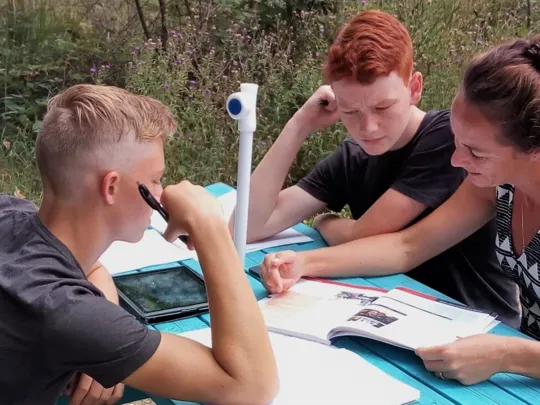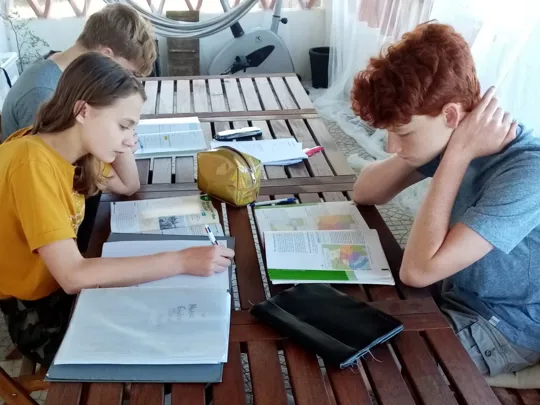About the author
Cathy Hitchin
Principal, Pamoja
Cathy is an experienced teacher, education influencer, resourceful manager and visionary leader. She’s been working in international education for 24 years, initially embarking on a career path in a renowned international school in Chile, that would take her on a journey of teaching and learning across five continents.
Students and the classroom are the heart of it all
I have always been involved in international education. My first job was in Santiago, Chile, where I was fortunate to be introduced to the IB DP and MYP. That experience soon convinced me that they were the only programmes and curricula that I wanted to teach, and that’s what I’ve done!
Since then, I’ve worked in countries such as Peru, India, the UK, Togo, Oman, and China.
As I progressed in my career from teacher to coordinator to department or school Head, and even now as the Principal of Pamoja, I always wanted to teach at least one course, as I believe it’s important to keep your finger on the pulse of the classroom and students’ reality.
Schools only exist to serve students, so you have to know how satisfied they are with what the school proposes and the challenges they are experiencing at any given time.
Pamoja: The only IB-approved DP school – and the largest
I took on the role of Pamoja Principal in August 2021, but I first got involved in 2019 when I became a Pamoja teacher. I really enjoyed distance teaching, and I was very surprised to develop a connection with my class that was as strong as in face-to-face classes.
Pamoja is the only IB-approved provider of online DP and CP courses. In China for example, we’ve been working with reputable international schools such as the Western Academy of Beijing, the Beijing World Youth Academy, Dulwich College Suzhou, Nanjing International School, the American International School of Guangzhou, the International School of Nanshan Shenzhen, Nord Anglia International School of Shanghai, and Shanghai Qibao Dwight High School, among others.
Initially, Pamoja started as an extension of the IB, as a means for schools to be able to offer more IB subjects to small numbers of students. Today, we have around 3,500 students enrolled, which I believe makes us the largest IB DP school anywhere.
Expanding the range of courses schools can offer
We work with over 700 IB schools around the world, ranging from long-standing international schools and newly authorised schools, to small independent schools that prepare national students for university study abroad. One constant is that we strive to become part of what each school does on an everyday basis, and be a true partner.
The reasons schools choose to partner with us are varied. Chief among them is making more subjects available via online learning. Pamoja is a viable alternative to schools investing in new courses themselves.
A frequent scenario is that of a student who wishes to study psychology or philosophy at university, but their school does not offer these subjects at DP level – making it harder for them to be accepted into university. In such cases, enrolling in a Pamoja Online Course ensures students can study the subjects they need for their future.
Another common scenario is students who transfer from another IB school, but their new school does not offer all the subjects they were studying previously. Pamoja can make it possible for these students to continue with their preferred courses.
Another important motivation for schools to partner with Pamoja is the IB five-year evaluation process. As part of their reauthorisation, the IB will evaluate how a school is developing, including in terms of the subjects they offer. We provide a convenient way for schools to add a whole range of new subjects, where it may otherwise be prohibitive for them to do so.
In addition, we can source teachers for schools who might be having difficulties recruiting. There are schools who outsource entire subject groups to us – for example, Group 3 courses (the humanities subjects). We also often take on whole school groups for Theory of Knowledge classes and the Extended Essay process. When this happens, we become really embedded in a school’s curriculum, contributing both academic breadth and teaching expertise.
In recent years, we have also started to build deeper connections with schools that enrol a lot of students in a particular subject. We provide them with a dedicated teacher who works with them year on year, ensuring that the teacher has a very close relationship with the school – just like they would if they were a permanent member of their faculty.
We continuously work with the IB to develop ideas for new courses. To give you an example, one of our current projects is Self-Taught Languages, which will be of interest to international schools whose students need help to develop their language skills in their mother tongue.
Ensuring the highest standards in online learning
There are obvious differences between a Pamoja Online Course and traditional classes. For example, our students can study at their own pace, with online materials. Secondly, Pamoja teachers are facilitators, so they don’t teach the material in the way they would in a face-to-face classroom.
But in the sense of delivering an IB Diploma course, it’s really similar to the traditional class. There is a dedicated teacher who answers students’ questions and marks their work during the whole two years. We track attendance through our engagement ratings, and we use advanced communication tools to help teachers and students feel like they’re in a classroom environment.
Of course, we do everything in our power to ensure a high standard for online teaching and learning. Firstly, Pamoja Online Courses have to be approved by the IB before we can teach them. Our teachers do not write the course materials themselves – they are facilitators whose focus is the students’ experience and learning.
Secondly, the academic success that Pamoja students have achieved is a story that inspires confidence. Year on year, Pamoja students secure grades that are higher than the IB world average. Given that we are a non-selective school and our students don’t sit entrance exams, we are immensely proud of their accomplishments. Likewise, our grade predictions are consistently highly accurate, which is indicative of how closely we understand our students.
Finally, we follow a rigorous process for teacher recruitment, training and annual reviews. Pamoja teachers form an impressive team: each one is fully committed to the IB, and many also teach in IB schools, are examiners or workshop leaders, and provide consultancy for the IB.
Even though we’re an online course provider, we do not lose sight of students as people. Schools that partner with us to offer Pamoja Online Courses must appoint a Site-Based Coordinator who collaborates closely with us, to oversee the students’ whole journey, provide pastoral care, and alert us to any personal circumstances that might affect a student’s performance.
Site-Based Coordinators don’t have to be subject teachers, since their core responsibility is to look out for the students in the school. We stay in constant two-way communication with them.
Our courses equip students with future-ready skills
There are a lot of transferable skills that students can pick up from doing an IB course in general. When they study online however, those skills can be developed in a lot more depth than they would be in a face-to-face classroom.
To give an example, our students work in global classrooms, often with classmates from four or five other countries. This means they have to learn how to collaborate in an online environment with students from different cultures and backgrounds.
Also, taking Pamoja Online Courses helps students to get better at time management. We prepare a week’s learning materials that they can study at their own pace and in their own time. Having this flexibility teaches them how to manage their time wisely, a very useful and important skill for university where there is no strict routine to follow and studying is self-directed. So we help to lay the groundwork for students’ futures.
To find out more about how we can support your school to open up new opportunities for students with online IB courses, speak to our team today.





































































































